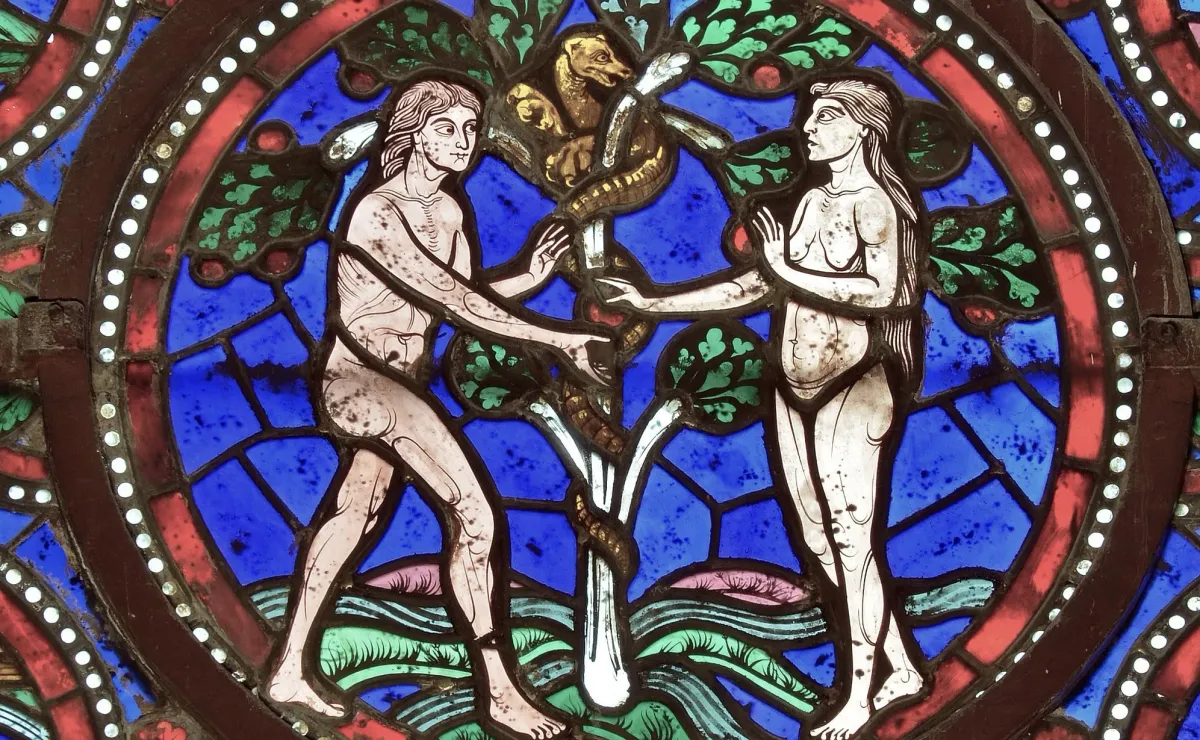On the Height of Adam's Fence
A careful reading of Genesis reveals a curious discrepancy between Yahweh's injunction and how Eve relates it whilst conversing with the Serpent.

After creating Adam in the Garden of Eden, and before deriving Eve from his side, Yahweh gave Adam one injunction:
“You may freely eat of every tree of the garden; but of the tree of the knowledge of good and evil you shall not eat, for in the day that you eat of it you shall die.”
That command was, of course, violated. In Genesis 3, Eve was deceived by the Serpent and ate from this tree, enticing Adam to do the same. Because of this sin, both of them were banished from the Garden.
This story of humanity's fall is, perhaps literally, a tale as old as time – God gives the law, man breaks the law, death enters into the cosmos. It is "settled history" (insofar as that chimera might apply to matters of mythic imagination) in the Jewish, Christian, and Islamic traditions. There is no more foundational narrative for man's spiritual and ethical condition.
But a careful reading of the text reveals a curious discrepancy between Yahweh's injunction and how Eve relates it whilst conversing with the Serpent. According to Eve, Yahweh said "You shall not eat of the fruit of the tree which is in the midst of the garden, neither shall you touch it, lest you die."
Did Yahweh say this?
Not according to the text. The injunction in Genesis 2 is "you shall not eat." Nothing more. But Eve adds, in Genesis 3, "you shall not touch."
Is this asymmetry a mere accident of the text? Is Eve more informed than the reader (and the author)? Does she know Yahweh's injunction to be, in fact, broader than what the Genesis account says was made known to Adam?
To answer "yes" to any of these questions is gravely consequential for any careful interpretation of the text. This account of humanity's cosmic beginnings – of Creation and Fall – is, of course, impeccably concise. Whatever bewildering complexities are embedded in creatio ex nihilo are condensed here into six days, morning and evening. All the diversity of flora and fauna – and interstellar relations, for that matter – are summarized into base and anthropocentric meta-categories. Even the Fall itself – a symbolic representation of man's real spiritual and psychological brokenness – becomes a whimsical parable of man, woman, snake, and fruit.
To allege, then, that this discrepancy is accidental trivializes any careful reading. If, in laboring to be concise, the author(s) compose a disjointed and ambiguous series of events, the narrative is broken.
But don't take my word for it. The Talmud acknowledges and expands on this dissonance in ways that are fundamentally consequential for understanding humanity's sin, and, more specifically, for how to interpret the Torah. From Avot de-Rabbi Natan 1:
What fence did Adam make for his words? The verse states: (Gen. 2) "And YHWH God commanded man, saying, 'you may eat from all the fruits of the garden; however from the tree (which provides) knowledge of good and evil you may not eat, for the day on which you will eat from it, you will surely die.'" First Man did not want to tell this to Eve in the same manner God had told it to him, rather he told her thus, making a safeguard for his words, (restrictive) to a greater extent than what the Holy One, Blessed be He, told him: (ibid.) "and concerning the fruit of the tree in (the center of) the garden, God said 'do not eat of it and do not touch it, lest you die.'" Because he wanted to guard himself and Eve from the tree - not even to touch. At that time, the evil Snake plotted in his heart, and said: "since I cannot make the Man stumble, I will go to make Eve fail. He then went and sat by her and had lengthy conversation with her. He told her: "if you say that God commanded us (against) touching - see that I will touch it and I will not die; you as well - if you touch it you will not die. What did that evil Snake do then? He stood and touched the tree with his hands and feet and made it shake until its fruit fell to the ground.
The "fence" referenced here is not unfamiliar in the Rabbinic tradition. Specifically, it hearkens to Pirkei Avot 1, which reads (emphasis mine):
Moses received the Torah at Sinai and transmitted it to Joshua, Joshua to the elders, and the elders to the prophets, and the prophets to the Men of the Great Assembly. They said three things: Be patient in [the administration of] justice, raise many disciples and make a fence round the Torah.
The idea of "fencing the Torah," then, is foundational in the Talmud, with roots understood to be in the Great Assembly (Knesset HaGedolah) of the early Second Temple period. The practice substantiates the thousands of (rather creative) Levitical regulations that extend beyond Yahweh's express laws, but without subtracting from or contradicting them. Rabbi David E. Ostrich (among many others) explains the "fence" this way – as culturally- and situationally-aware "innovations" designed to aid in preserving the Torah's integrity:
Just as a fence around a yard or house protects it, many of the Rabbinic innovations were designed to protect the commandments in the Torah. These developments were not seen as additions or subtractions (prohibited by the Torah in Deuteronomy 4.2 and 13.1), but rather as aids in maintaining the integrity of the mitzvot.
In this way, Adam's fence is to blame for the difference between Yahweh's injunction in Genesis 2 (given only to Adam, before Eve was derived) and what Eve said to the Serpent – information she received from Adam – in Genesis 3. In making a "safeguard," Adam extended the injunction "to a greater extent than what the Holy One ... told him."
Rabbi Louis Ginzberg condenses this story even further, writing the following in Legends of the Jews (1913) – a synthesis of various midrashim from ancient and modern rabbinic literature. He writes:
"...in his zeal to guard her against the transgressing of the Divine command, Adam had forbidden Eve to touch the tree, though God had mentioned only the eating of the fruit. It remains a truth, what the proverb says, 'Better a wall ten hands high that stands, than a wall a hundred ells high that cannot stand.' It was Adam's exaggeration that afforded the serpent the possibility of persuading Eve to taste of the forbidden fruit."
It's important to note here, however, that the Talmud stops short of condemning Adam's decision. Fencing the Torah is the duty of the prophets and elders. Will they always get this right? If they don't, in a sincere attempt to protect the Law, are they to blame?
It's a good question. I tend to think that to fence God's law is to fence God's love. And that to add to God's law is to, like the Pharisees (according to Jesus), "bind heavy burdens, hard to bear, and lay them on men’s shoulders." After all, the law is summed up, according to St. Paul, in nothing more than love:
The commandments, "You shall not commit adultery, You shall not kill, You shall not steal, You shall not covet," and any other commandment, are summed up in this sentence, "You shall love your neighbor as yourself." Love does no wrong to a neighbor; therefore love is the fulfilling of the law.
But even if we accept Paul's theology here, it remains true that even Christ obligates his followers to submit to the scribes and Pharisees, even whilst they "bind heavy burdens" that are, ostensibly, oppressive. Jesus speaks in Matthew 23 (emphasis mine):
The scribes and the Pharisees sit on Moses' seat; so practice and observe whatever they tell you, but not what they do; for they preach, but do not practice. They bind heavy burdens, hard to bear, and lay them on men's shoulders; but they themselves will not move them with their finger. They do all their deeds to be seen by men; for they make their phylacteries broad and their fringes long, and they love the place of honor at feasts and the best seats in the synagogues, and salutations in the market places, and being called rabbi by men. But you are not to be called rabbi, for you have one teacher, and you are all brethren.
These fences, then, are embedded into our experience of God's law. But when, and how, to "fence" God's law is the first moral issue raised in the Torah, and the margin wherein Christ both offended the Pharisees and liberated the poor. Getting this wrong was, and is, the crux of all human brokenness – as much today, I think, as then. Any fidelity to the Torah, or to God's absolute love as demonstrated in Christ, entails a continual reckoning with sometimes-extraneous injunctions. Indeed, interpretive margins always exist, fences or not – hermeneutics is no exact science, and the use of language itself is an exercise in reification that muddies the purity of abstract forms, divine injunction foremost among them (God's Law as given to Moses is, of course, almost shockingly concise, yet even then is argued by Jesus and St. Paul to be concessionary – the real law is, simply, love).
So I propose this both as wise and, for better or worse, inescapable: That any seeker of God commit to humility before these fences – erected either by religious authorities or at our own hands (by virtue of our own shaky faculties) – that both protect and obscure our knowledge of the divine. In so doing, and with the knowledge that fences are always imperfect, perhaps we can fare better than Eve against cunning enemies.





